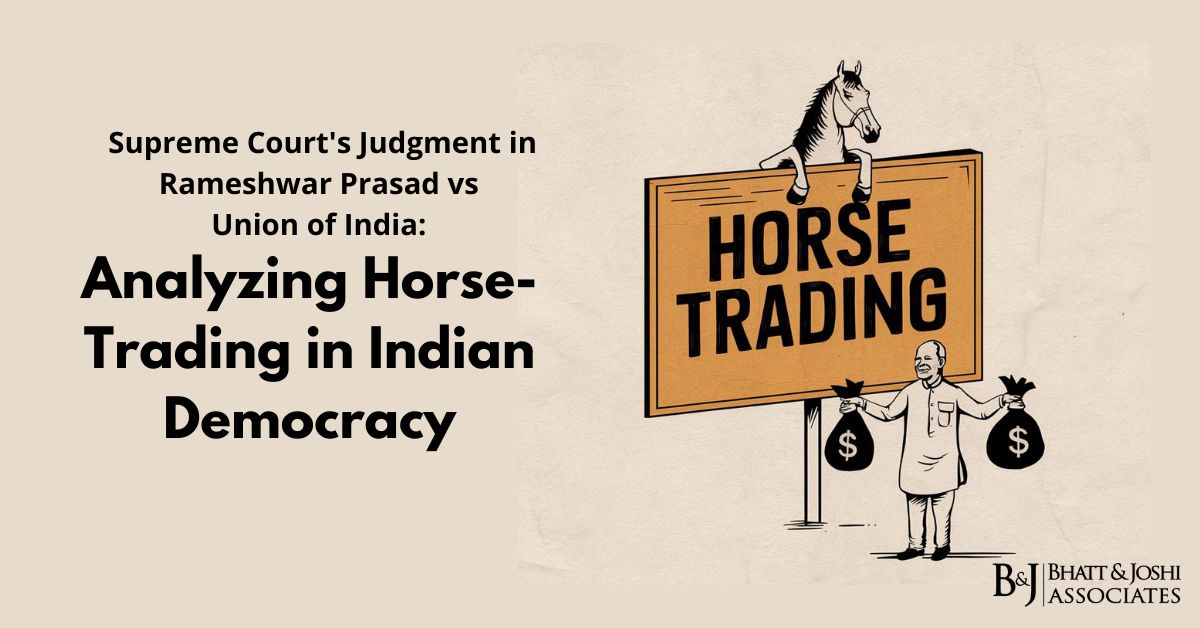Supreme Court on Horse-Trading in Indian Politics: Analyzing Rameshwar Prasad vs Union of India’s Judgment

Introduction
The Supreme Court of India’s landmark judgment in Rameshwar Prasad vs Union of India addresses the controversial issue of horse-trading in Indian politics. This article analyzes the judgment in the context of recent political developments and explores how the ruling could be reconsidered in light of ongoing allegations of horse-trading.
Context and Background
The Article’s Context
A recent article by The Hindu discusses the potential implications of post-poll alliances and the Supreme Court’s stance on political stability and integrity. The article highlights the importance of judicial oversight in preventing unethical practices such as horse-trading, which undermine democratic principles.
The Judgment in Rameshwar Prasad vs Union of India
The case of Rameshwar Prasad vs Union of India (2006) is a pivotal Supreme Court decision that scrutinized the dissolution of the Bihar Legislative Assembly. The petitioners challenged the dissolution, arguing it was done to prevent the formation of a government by potential defectors. The Court’s judgment has significant implications for understanding the judiciary’s role in safeguarding democratic processes against horse-trading.
Key Observations: Supreme Court’s Horse-Trading View
Supreme Court’s View on Dissolution of the Assembly
The Supreme Court, in its judgment, held that the dissolution of the Bihar Assembly was unconstitutional. The Court observed,
“The dissolution of the Assembly is an extreme step and should be taken only when there is no other alternative. It cannot be a tool to prevent the formation of a government merely on apprehensions of horse-trading.”
The Court on Constitutional Morality and Political Integrity
The judgment emphasized the importance of constitutional morality and political integrity. The Court stated,
“The Governor must be guided by constitutional principles and must ensure that any action taken is in furtherance of democratic values and not for preventing the formation of a legitimate government.”
Supreme Court Addressing Horse-Trading Allegations
The Court recognized the dangers of horse-trading but insisted on following due process. It noted,
“While horse-trading is a grave concern, it cannot justify the dissolution of a democratically elected Assembly. Allegations must be substantiated with evidence, and preventive measures must align with constitutional mandates.”
Supreme Court Analysis of Horse-Trading in Indian Politics
Recent Allegations and Examples
Horse-trading has become a recurrent issue in Indian politics, with several instances of elected representatives switching loyalties post-elections. This practice undermines the electorate’s mandate and raises questions about the ethical conduct of politicians.
Impact of the Judgment on Current Practices
The Supreme Court’s ruling in Rameshwar Prasad underscores the need for concrete evidence before taking drastic measures like dissolution. However, given the frequency of horse-trading allegations, there is a need to revisit this judgment to ensure that democratic integrity is maintained.
Possible Reconsiderations
In light of repeated examples of horse-trading, the judgment could be reconsidered to include more stringent guidelines for governors and other constitutional authorities. This could involve:
- Strengthening Anti-Defection Laws: Enhancing the provisions of the Tenth Schedule to prevent unethical defections.
- Judicial Oversight: Establishing a mechanism for quick judicial review of decisions involving the dissolution of assemblies or dismissal of governments.
- Evidence-Based Actions: Requiring concrete and verifiable evidence before taking preventive measures against potential horse-trading.
Conclusion: Supreme Court’s Role in Tackling Horse-Trading
The Supreme Court’s judgment in Rameshwar Prasad vs Union of India plays a crucial role in upholding democratic values and constitutional morality. However, the persistent issue of horse-trading in Indian politics necessitates a fresh look at the ruling to adapt to contemporary challenges. By incorporating stricter guidelines and ensuring robust judicial oversight, the judiciary can better safeguard the democratic process from unethical practices.
 Whatsapp
Whatsapp

